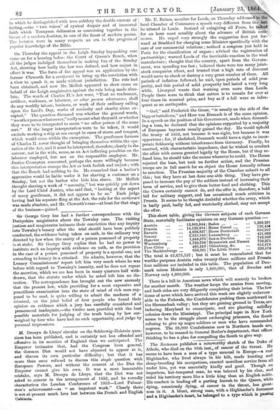Sir George Grey has had a further correspondence with the
Derbyshire magistrates about the Townley case. The visiting justices and magistrates intimate their conviction that any inquiry into Townley's lunacy after the trial should have been publicly conducted, the evidence being taken on oath, in the ordinary way directed by law when the sanity of a person possessed of property is at stake. Sir George Grey replies that he had no power to institute such an inquiry with evidence on oath, as the provision in the case of a person possessed of property is a special one, not extending to lunacy in a criminal. He admits, however, that the Lunacy Commissioners' report left him very much where he was before with regard to Townley's insanity, and he does not repeat the assertion, which we see has been in many quarters half with- drawn, that the statute under which he acted left him no dis- cretion. The correspondence has brought out the new anomaly that the present law, while providing for a most expensive and punctilious examination into the state of mind of rich men sup- posed to be mad, is quite willing to admit the madness of a criminal, on the joint belief of four people who found their opinion on evidence which a jury has carefully considered and pronounced inadequate,—the twelve men provided with the best possible materials for judging of the truth being by law out- weighed by four who have had no such opportunity, and judge by personal impressions.


































 Previous page
Previous page